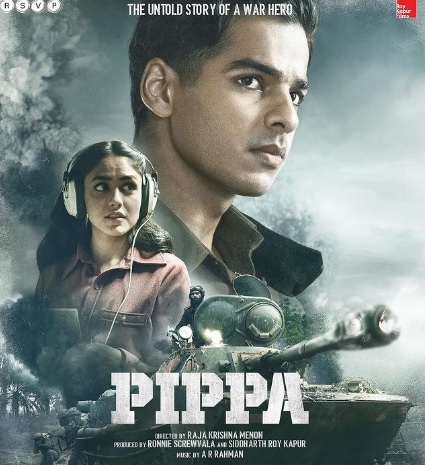Kazi Nazrul Islam's kin call for removal of Pippa song, makers issue apology
8:37 AM
Posted by Fenil Seta

Ruman Ganguly (BOMBAY TIMES; November 16, 2023)
The controversy:
An iconic song by revolutionary poet, composer Kazi Nazrul Islam, Karar Oi Louho Kopat, has been in the eye of a raging controversy ever since it was featured in the OTT film Pippa, starring Ishan Khatter and Mrunal Thakur. The original song, composed in 1922, was one of the most powerful clarion calls against British Raj. Later it also became a call to action during the Bangladesh Liberation War of 1971, which is central to the film in question.
However, it has been re-imagined by A R Rahman, with a new tune and arrangement, sung by a clutch of young performers. Followers of Nazrul, who is also the national poet of Bangladesh, have been sharing their disappointment over the new composition, which they feel has "taken away from the essence of the song." Protests have been particularly sharp in among the Bengali diaspora, and in Bangladesh where they have urged the Prime Minister to intervene and ensure that the song is removed from the film.
---------------------------------------------------
“We're all familiar with AR Rahman as a genius composer and a thoughtful individual. He's also a good friend of mine. However, it's distressing to discover that the iconic song of the legendary rebel poet and composer, Kazi Nazrul Islam, has been brutally murdered. Like many others, I'm deeply shocked by this tragedy. It's a nightmarish scenario, and even as a standalone piece, the impact is truly shocking.”
--- Music composer Debojyoti Mishra
The family tangle:
The controversy took a different turn when it emerged that in 2021, Nazrul's daughter-in-law Kalyani Kazi had granted the license of this song to the makers (Roy-Kapur Productions Pvt Limited) of the film for Rs 2 lakh only. It appears that she had introduced herself and one of her sons (Anirban) as sole living heirs of the rebel poet. Kalyani passed away in February this year. Her US-based daughter told TOI, she had no inkling of any such contract being signed.
Meanwhile, Kazi Arindam, Kalyani's other son, has called for a press conference later this week in Kolkata. Speaking to us about the controversy, he said: "Kazi Nazrul Islam had two families – Sabyasachi and Aniruddha (which is us). The whole situation was created by my brother Anirban, who kept our 85-year-old mother in the dark, forcing her to sign documents claiming he is the sole survivor of our illustrious family. However, he has to prove what he has claimed, knowing fully well that we are all alive and well."
"We request the production house (Ray Kapur Films) and the director to remove the song from the film because while they have worked on it with stalwarts of the industry, it is unfortunate that they haven't understood the history and the meaning behind it. They could have done it meaningfully."
The apology:
With calls to boycott the new version of the song gathering steam, makers of Pippa recently issued a statement, defending their right to have reimagined the song and apologizing for inadvertently causing anguish.
"We wish to clarify that our rendition of the song is a sincere artistic interpretation, embarked upon only after securing the necessary adaptation rights from the estate of the Late Mr. Kazi Nazrul Islam. We have deep respect for the original composition and for the Late Mr Kazi Nazrul Islam, whose contribution to the musical, political and social landscape of the Indian subcontinent is immeasurable. This album was created as a tribute to the men and women who dedicated their lives to the liberation of Bangladesh and keeping in mind the sentiments of their struggle for freedom, peace and justice."
Claiming that they had stuck to the legal agreement, they said: "We approached the making of this song by faithfully following both the letter and the spirit of the license agreement for the lyrics, as duly signed with Late Mrs Kalyani Kazi and witnessed by Mr Anirban Kazi. Our intent was to pay homage to the cultural significance of the song while adhering to the terms set forth in our agreement, which permitted us to use the lyrics with a new composition."
Recognizing the emotional bonds that millions of Bengalis had had with this song for generations, the makers wrote: "While all art is inherently subjective, if our interpretation has hurt sentiments or caused unintended distress, we offer our sincere apologies."
At the time of going to press, A R Rahman was not available for comment.
This entry was posted on October 4, 2009 at 12:14 pm, and is filed under
A R Rahman,
Anirban Kazi,
Bangladesh,
Bollywood News,
Debojyoti Mishra,
Kalyani Kazi,
Kazi Nazrul Islam,
Pippa
. Follow any responses to this post through RSS. You can leave a response, or trackback from your own site.
Subscribe to:
Post Comments (Atom)
Post a Comment